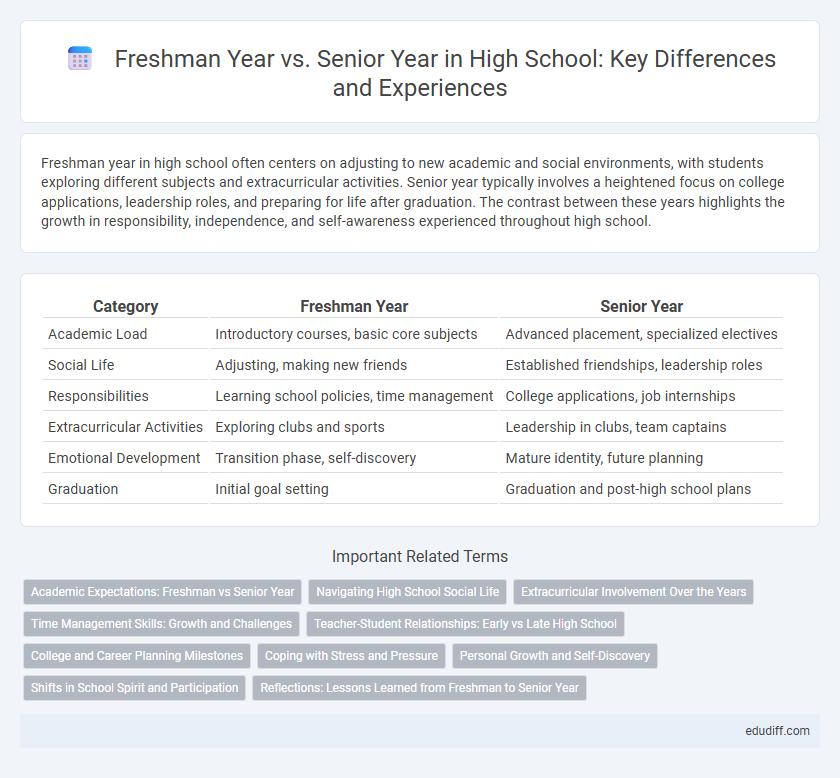Freshman year in high school often centers on adjusting to new academic and social environments, with students exploring different subjects and extracurricular activities. Senior year typically involves a heightened focus on college applications, leadership roles, and preparing for life after graduation. The contrast between these years highlights the growth in responsibility, independence, and self-awareness experienced throughout high school.
Table of Comparison
| Category | Freshman Year | Senior Year |
|---|---|---|
| Academic Load | Introductory courses, basic core subjects | Advanced placement, specialized electives |
| Social Life | Adjusting, making new friends | Established friendships, leadership roles |
| Responsibilities | Learning school policies, time management | College applications, job internships |
| Extracurricular Activities | Exploring clubs and sports | Leadership in clubs, team captains |
| Emotional Development | Transition phase, self-discovery | Mature identity, future planning |
| Graduation | Initial goal setting | Graduation and post-high school plans |
Academic Expectations: Freshman vs Senior Year
Freshman year prioritizes foundational skills, with expectations centered on adapting to a structured curriculum and developing time management. Senior year demands advanced critical thinking, independent research, and preparation for college-level coursework, often including AP or honors classes. Academic performance in senior year significantly impacts college admissions and scholarship opportunities.
Navigating High School Social Life
Freshman year involves discovering new social groups and adjusting to the high school environment, often marked by uncertainty and the need to establish friendships. Senior year emphasizes maintaining deep connections and balancing social life with college preparations and responsibilities. Navigating these shifts requires effective communication skills and self-awareness to foster meaningful relationships throughout high school.
Extracurricular Involvement Over the Years
Extracurricular involvement typically shifts significantly from freshman to senior year, with freshmen often participating in multiple clubs and activities to explore interests. By senior year, students tend to focus on leadership roles or specialized activities, reflecting deeper commitment and skill development. This progression enhances college applications by demonstrating sustained engagement and growth in specific areas.
Time Management Skills: Growth and Challenges
Freshman year requires students to adapt to a larger workload, often leading to struggles with time management as they learn to balance academics, extracurriculars, and social life. By senior year, students typically develop advanced time management skills, efficiently prioritizing tasks and meeting deadlines despite increased responsibilities such as college applications and leadership roles. This growth in time management reflects significant personal development and prepares students for future academic and professional success.
Teacher-Student Relationships: Early vs Late High School
Freshman year often features more structured teacher-student relationships, as educators focus on guiding students through the transition to high school and establishing foundational skills. By senior year, these relationships typically evolve into more personalized and collaborative interactions, with teachers serving as mentors to support college preparation and career goals. Increased mutual respect and familiarity characterize the shift from early high school dependency to late high school autonomy.
College and Career Planning Milestones
Freshman year focuses on exploring interests through introductory courses, joining clubs, and meeting with counselors to build a strong academic foundation. Senior year centers on finalizing college applications, securing recommendation letters, attending college interviews, and completing career-focused internships or job shadowing. Key milestones include PSAT participation early on and FAFSA submission during the senior year to ensure financial aid eligibility.
Coping with Stress and Pressure
Freshman year often brings overwhelming stress as students adjust to new academic expectations and social environments, requiring the development of foundational coping strategies like time management and seeking support. Senior year stress centers more on college applications and future planning, intensifying pressure but also fostering resilience through experience and goal-oriented focus. Effective coping during both years includes mindfulness practices, balanced workloads, and access to counseling resources, crucial for maintaining mental health throughout high school.
Personal Growth and Self-Discovery
Freshman year often marks the beginning of personal growth as students encounter new challenges, develop social skills, and explore diverse interests. Senior year reflects deeper self-discovery, with a clearer sense of identity, goal-setting, and emotional maturity shaped by four years of experiences. The contrast between these years highlights significant evolution in confidence, responsibility, and self-awareness among high school students.
Shifts in School Spirit and Participation
Freshman year often features high enthusiasm and eagerness as students experience school spirit through orientation events and joining clubs, while senior year shows more selective participation influenced by academic priorities and college preparations. Participation in sports and school-wide activities tends to peak in middle years but may decline by senior year due to increased focus on graduation requirements. Senior students exhibit a mature, often nostalgic approach to school spirit, emphasizing leadership roles in maintaining traditions and mentoring underclassmen.
Reflections: Lessons Learned from Freshman to Senior Year
The transition from freshman to senior year reveals significant academic and personal growth marked by increased time management skills and stronger critical thinking abilities. Freshmen often struggle with balancing coursework and extracurricular activities, while seniors develop efficient study habits and deeper self-awareness. Reflecting on these years highlights how embracing challenges and learning from setbacks shape resilience and readiness for post-secondary success.
Freshman Year vs Senior Year Infographic

 edudiff.com
edudiff.com